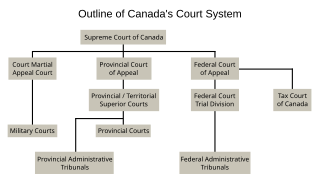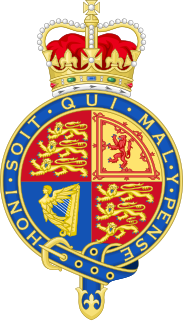This page is based on this
Wikipedia article Text is available under the
CC BY-SA 4.0 license; additional terms may apply.
Images, videos and audio are available under their respective licenses.

The Judicial Committee of the Privy Council (JCPC) is the highest court of appeal for certain British territories and Commonwealth countries. Established on 13 August 1833 to hear appeals formerly heard by the King-in-Council, the Privy Council formerly acted as the court of last resort for the entire British Empire, and continues to act as the highest court of appeal for several independent Commonwealth nations, the Crown Dependencies, and the British Overseas Territories.

The Supreme Court of Canada is the highest court of Canada, the final court of appeals in the Canadian justice system. The court grants permission to between 40 and 75 litigants each year to appeal decisions rendered by provincial, territorial and federal appellate courts. Its decisions are the ultimate expression and application of Canadian law and binding upon all lower courts of Canada, except to the extent that they are overridden or otherwise made ineffective by an Act of Parliament or the Act of a provincial legislative assembly pursuant to section 33 of the Canadian Charter of Rights and Freedoms.

Hill v Church of Scientology of Toronto February 20, 1995- July 20, 1995. 2 S.C.R. 1130 was a libel case against the Church of Scientology, in which the Supreme Court of Canada interpreted Ontario's libel law in relation to the Canadian Charter of Rights and Freedoms.
Landmark court decisions, in present-day common law legal systems, establish precedents that determine a significant new legal principle or concept, or otherwise substantially affect the interpretation of existing law. "Leading case" is commonly used in the United Kingdom and other Commonwealth jurisdictions instead of "landmark case" as used in the United States.

The court system of Canada forms the judicial branch of government, formally known as "The Queen on the Bench", which interprets the law and is made up of many courts differing in levels of legal superiority and separated by jurisdiction. Some of the courts are federal in nature, while others are provincial or territorial.
Roland Almon Ritchie, was a Canadian lawyer and puisne justice of the Supreme Court of Canada.
In Canadian law, a reference question or reference case is a submission by the federal or a provincial government to the courts asking for an advisory opinion on a major legal issue. Typically the question concerns the constitutionality of legislation.

St Catharines Milling and Lumber Co v R was the leading case on Aboriginal title in Canada for more than 80 years. The Judicial Committee of the Privy Council, affirming a ruling by the Supreme Court of Canada, held that Aboriginal title over land was allowed only at the Crown's pleasure, and could be taken away at any time. This case, involving Ojibway Treaty No. 3 which had never been previously litigated before any court, is a leading decision in Canada on the differences between the division of legislative powers and property rights under the Constitution of Canada.
Section 11 of the Canadian Charter of Rights and Freedoms is the section of the Canadian Constitution that protects a person's legal rights in criminal and penal matters. This includes both criminal as well as regulatory offences, as it provides rights for those accused by the state for public offences. There are nine enumerated rights protected in section 11.

Little Sisters Book and Art Emporium v Canada [2000] 2 S.C.R. 1120, 2000 SCC 69 is a leading Supreme Court of Canada decision on freedom of expression and equality rights under the Canadian Charter of Rights and Freedoms. It was held that the Customs Act, which gave broad powers to customs inspectors to exclude "obscene" materials, violated the right to freedom of expression under section 2 but was justifiable under section 1.

R v Askov, [1990] 2 S.C.R. 1199, is a 1990 appeal heard before the Supreme Court of Canada which established the criteria and standards by which Canadian courts judge whether an accused's right under the Canadian Charter of Rights and Freedoms, Section 11(b) "to be tried within a reasonable time" has been infringed.

M v H [1999] 2 S.C.R. 3, is a landmark decision of the Supreme Court of Canada on the rights of same-sex couples to equal treatment under the Constitution of Canada.

R v Marshall; R v Bernard 2005 SCC 43 is a leading Aboriginal rights decision of the Supreme Court of Canada where the Court narrowed the test from R. v. Marshall for determining the extent of constitutional protection upon Aboriginal practices. The Court held that there was no right to commercial logging granted in the "Peace and Friendship treaties of 1760", the same set of treaties where the right to commercial fishing was granted in the R. v. Marshall decision. This decision also applied and developed the test for aboriginal title from Delgamuukw v British Columbia.

R v O'Connor, [1995] 4 S.C.R. 411 is a leading Supreme Court of Canada decision on disclosure of medical records. The Court held that the medical and counselling records of a complainant in a sexual assault case that are held by a third party can be disclosed by order of the judge if they meet two requirements.

R v Seaboyer, [1991] 2 S.C.R. 577 is a leading Supreme Court of Canada decision where the Court struck-down a rape-shield provision of the Criminal Code as it violated the right to "full answer and defence" under sections 7 and 11(d) of the Canadian Charter of Rights and Freedoms. The case was decided with R v Gayme.
R v Marshall [1999] 3 S.C.R. 456 and R v Marshall [1999] 3 S.C.R. 533 are two decisions given by the Supreme Court of Canada on a single case regarding a treaty right to fish.
The passage of the Canadian Charter of Rights and Freedoms in 1982 allowed for the provision of challenging the constitutionality of laws governing prostitution law in Canada in addition to interpretative case law. Other legal proceedings have dealt with ultra vires issues. In 2013, three provisions of the current law were overturned by the Supreme Court of Canada, with a twelve-month stay of effect. In June 2014, the Government introduced amending legislation in response.





